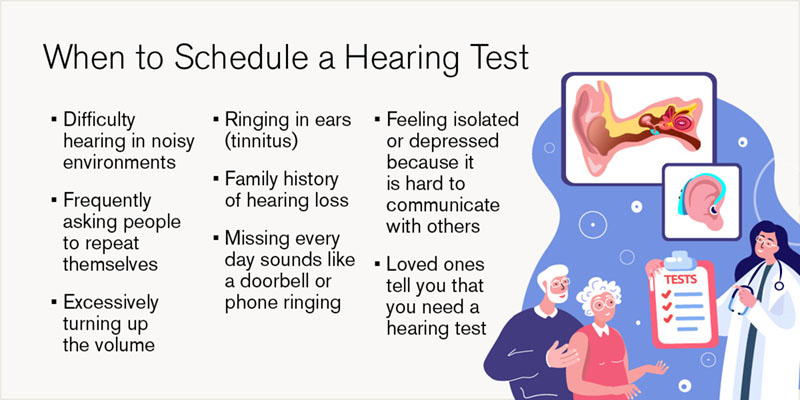Understanding the Link Between Hearing Loss and Serious Health Conditions
January 9, 2025
Categories: Audiology
Tags: hearing loss
 By Ramona Rupar AuD, Audiology
By Ramona Rupar AuD, Audiology
Hearing loss is often seen as a single, isolated condition, but it's frequently intertwined with a range of other health concerns, amplifying risks and complications. From cognitive decline to cardiovascular disease, understanding the broader impact of untreated hearing loss is essential for taking proactive steps toward a heathier life.
We spoke with Ramona Rupar, AuD, an audiologist with Loyola Medicine, to explore how hearing loss is connected to various conditions and why addressing it early can make a significant difference for your overall health.
Cognitive decline and dementia from hearing loss
One of the most concerning links associated with hearing loss is its connection to cognitive decline, particularly dementia. According to research, older adults with untreated hearing loss are more likely to experience accelerated brain shrinkage, which impacts areas of the brain responsible for processing sound and speech. This decline can increase the cognitive workload on the brain. Without regular auditory stimulation, the brain loses the ability to interpret sounds efficiently, leading to what is described as “auditory deprivation.”
As the brain struggles to fill in auditory gaps, it diverts energy from other essential cognitive functions, potentially speeding up the onset of dementia and other cognitive impairments. This decline is not isolated to severe hearing loss. Even mild hearing loss can increase the risk of cognitive decline. With early intervention, like hearing aids, these risks can be reduced, as these devices help maintain auditory stimulation and support cognitive health.
“When hearing loss goes untreated, the pathway from the inner ear to the brain loses integrity. It’s like watching TV with static – the brain works harder to interpret sounds, which can lead to cognitive decline over time," says Dr. Rupar.
Untreated hearing loss and mental health
The mental health impacts of hearing loss are often subtle, but significant. Individuals with untreated hearing loss frequently experience social isolation and depression. Imagine trying to keep up with conversations at a busy family gathering, only to miss punchlines, misinterpret words, or have to ask others to repeat themselves. These misunderstandings can be frustrating and exhausting, leading many to withdraw from social situations rather than face the effort of straining to hear. Over time, this isolation can create a sense of loneliness, making those with hearing loss twice as likely to suffer from depression compared to those without it.
“Imagine being in a room full of friends and family, but feeling like you’re in a soundproof bubble. This isolation often leads to social withdrawal, which is why untreated hearing loss is closely linked to depression and mental health issues," says Dr. Rupar.
Cardiovascular health and hearing loss
While it may seem unlikely, cardiovascular health is strongly linked to hearing abilities. Blood flow is essential to the inner ear’s delicate structures, which rely on a rich supply of oxygen and nutrients to function properly. When heart health is compromised, blood flow to the ears may be restricted, resulting in potential damage to these sensitive cells. This connection between cardiovascular disease and hearing health means that those with heart-related issues, such as high blood pressure, may be at higher risk of hearing loss. Given that the inner ear is often the first area impacted by restricted blood flow, monitoring heart health can also provide insights into hearing health.
Hypertension, stress and hearing impairment
Similarly, stress and hypertension are known to impact hearing, particularly by increasing the risk of tinnitus, a persistent ringing, buzzing, or hissing sounds in the ears. Chronic stress can elevate blood pressure, which then strains the blood vessels in the ear, leading to damage. This damage may initially present as mild hearing loss or tinnitus, but over time, it can contribute to more severe hearing impairments. Furthermore, individuals with tinnitus often find that their symptoms worsen with stress, creating a feedback loop that can make stress management crucial for maintaining hearing health.
Diabetes and hearing loss
Diabetes is another condition closely linked to hearing loss. Research indicates that individuals with diabetes are twice as likely to experience hearing issues than those without. Elevated blood sugar levels can damage small blood vessels and nerves throughout the body, including those in the inner ear. This damage can impair nerve signals to the brain, leading to what’s known as sensorineural hearing loss. Given that diabetes management is crucial for overall health, it’s equally important for maintaining hearing function as well. Regular hearing screenings are highly recommended for individuals with diabetes to catch any early signs of hearing impairment.
Sleep apnea and hearing impairment
Sleep apnea, a condition that affects nearly 22 million Americans, has also been linked to hearing loss. The disorder’s impact on breathing during sleep can result in reduced blood oxygen levels, which may, in turn, affect the vascular supply to the inner ear. Research suggests that sleep apnea may make individuals up to 90% more likely to experience hearing loss, particularly those in the Hispanic community, though more studies are needed to fully understand this connection. Regardless, sleep apnea treatment not only improves sleep quality and cardiovascular health but may also help protect against hearing damage.
Falls, balance issues, and hearing loss in older adults
Untreated hearing loss can contribute to balance issues and an increased risk of falls, particularly among older adults. In fact, each year, about one quarter of adults aged 65 and older fall, and research suggests that untreated hearing loss may be a contributing factor. The inner ear plays a primary role in balance and spatial orientation, and when hearing function is impaired, it can affect one’s ability to navigate environments safely. While older adults may not like wearing hearing aids, the risk of falls is too great to avoid them.
The importance of regular hearing screenings
Despite the significant health risks associated with untreated hearing loss, hearing checks are often overlooked during routine health screenings. For many, hearing loss progresses so gradually that they may not notice it until it affects daily life. It’s crucial to understand the signs that signal the need for a hearing evaluation, including difficulties hearing in noisy environments, frequently asking others to repeat themselves, or turning up the volume on the television louder than usual. Additionally, ringing in the ears, mental fatigue from concentration, and even physical imbalance can all be signs that a hearing evaluation is warranted.

“Hearing difficulties often show up in situations with background noise, like restaurants. Many people don’t notice the decline themselves—it’s often family members or friends who suggest they get their hearing checked. Those suffering from hearing loss should try and understand the concerns of their family," says Dr. Rupar.
Recognizing the intertwining effects of hearing health with other medical conditions can help us understand the overall impact on wellness. Untreated hearing loss can lead to a cascade of other health issues, from cognitive and mental health challenges to personal safety and fall risks. By seeking early intervention — through regular hearing screenings, hearing aids, or lifestyle adjustments — individuals can protect not only their hearing but also their overall well-being. Prioritizing hearing health is an investment that pays dividends across all facets of life, ensuring that individuals remain connected, engaged, and healthy.
Dr. Ramona Rupar is a skilled audiologist at Loyola Medicine, dedicated to diagnosing and treating hearing loss and related auditory disorders. She earned her Doctor of Audiology (AuD) degree from Rush University. Dr. Rupar works closely with patients to manage hearing health, from initial evaluations to customized treatment plans, including hearing aids and other assistive devices. Her compassionate approach focuses on improving communication and enhancing quality of life, ensuring her patients remain connected and engaged in their daily lives
Book an appointment today to see Dr. Rupar by self-scheduling an in-person or virtual appointment using myLoyola.
